
Just Five Minutes More a Day Could Prevent Thousands of Deaths, Landmark Study Finds
Small, rea...

As Married At First Sight returns to Australian screens in 2026, viewers are once again getting a ...

A migraine attack[1] is not just a “bad headache”.
Migraine is a debilitating neurological co...

Two years ago, I entered the digital marketing space with the mindset of an engineering student ...

Australian small businesses are being hit harder than ever by costly disruptions...

McDonald’s Australia is once again rolling up its sleeves for Clean Up Australia Day, marking 36...

Iftar returns to IFTAR, with the Western Sydney favourite opening after dark for Ramadan
IFTA...

Depression is a complex and deeply personal experience. While almost everyone has periods of s...

We are at the end of the great Australian summer, and this is the perfect time to start thinking a...


















